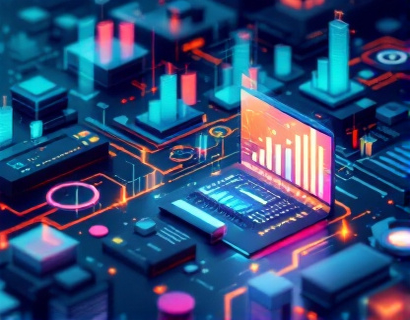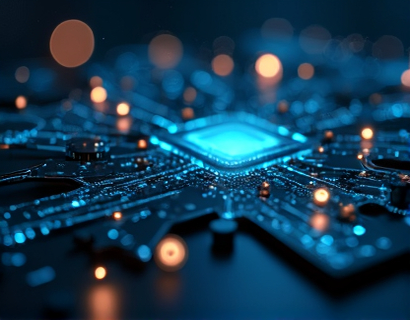Unleashing Digital Potential: Harnessing AI and Crypto for Enhanced User Experiences in the Tech Frontier
The digital age has ushered in a revolution of unprecedented technological advancements, with artificial intelligence (AI) and cryptocurrency standing at the forefront of this transformation. The convergence of these two cutting-edge technologies is redefining the way we interact with digital services, offering users seamless, intuitive, and highly personalized experiences. This article explores the innovative solutions that emerge from the fusion of AI and cryptocurrency, highlighting how these technologies are enhancing user interactions and setting the stage for a more efficient and intuitive future.
The integration of AI into digital platforms has already begun to transform service delivery and user engagement. AI-driven algorithms can analyze vast amounts of data to understand user behavior, preferences, and needs, enabling services to adapt and respond in real-time. For instance, AI-powered chatbots provide instant customer support, resolving queries and issues with unprecedented speed and accuracy. These chatbots learn from each interaction, continuously improving their performance and providing a more personalized experience for users.
Cryptocurrency, on the other hand, introduces a decentralized and secure method of transaction, eliminating the need for intermediaries and reducing costs. When combined with AI, cryptocurrency can offer even more sophisticated solutions. For example, AI can be used to predict market trends and optimize trading strategies, providing users with better investment decisions and potentially higher returns. This synergy not only enhances the functionality of digital services but also empowers users with greater control and transparency.
One of the key areas where AI and cryptocurrency are making a significant impact is in the realm of identity verification and security. Traditional methods of verifying user identities are often cumbersome and vulnerable to fraud. By leveraging blockchain technology, a decentralized ledger system, and AI algorithms, platforms can create robust and secure identity management systems. These systems use biometric data and behavioral patterns to authenticate users, ensuring that only authorized individuals access sensitive information. This not only enhances security but also streamlines the user onboarding process, making it faster and more user-friendly.
Another innovative application of AI and cryptocurrency is in the field of content creation and distribution. AI algorithms can analyze user preferences and generate personalized content recommendations, ensuring that users are always engaged with relevant and interesting material. In the cryptocurrency space, smart contracts can automate the distribution of content based on specific conditions, such as payment receipt or viewer engagement. This automation reduces the need for manual intervention, making the process more efficient and cost-effective.
The intersection of AI and cryptocurrency also opens up new possibilities for data privacy and user consent. Blockchain's inherent transparency and immutability can be combined with AI to create systems that respect user privacy while still allowing for data sharing and monetization. Users can grant or revoke access to their data through smart contracts, ensuring that their preferences are respected and their information is used ethically. This approach not only builds trust but also complies with stringent data protection regulations, providing a competitive edge for digital platforms.
In the realm of gaming, AI and cryptocurrency are revolutionizing the way players interact with virtual worlds. AI-driven non-playable characters (NPCs) offer more realistic and dynamic interactions, enhancing the overall gaming experience. Cryptocurrency can be used as in-game currency, allowing players to earn and trade digital assets seamlessly. Blockchain technology ensures that these transactions are secure and transparent, reducing the risk of fraud and ensuring fair play. This fusion also enables the creation of decentralized gaming platforms, where players can own and control their in-game assets, fostering a more community-driven and equitable gaming ecosystem.
The healthcare sector is another area where the combination of AI and cryptocurrency is showing immense potential. AI can analyze medical data to provide accurate diagnoses and personalized treatment plans, while blockchain can secure and manage patient records, ensuring privacy and interoperability. Cryptocurrency can facilitate secure and efficient transactions for healthcare services, such as payments for treatments or access to medical research data. This integration not only improves patient care but also streamlines administrative processes, reducing costs and improving overall efficiency.
In the financial industry, AI and cryptocurrency are transforming traditional banking and financial services. AI-powered algorithms can detect fraudulent transactions in real-time, enhancing security and reducing losses. Cryptocurrency offers a faster and more cost-effective alternative to traditional payment methods, especially for cross-border transactions. Smart contracts can automate complex financial processes, such as loan agreements and insurance claims, reducing the need for intermediaries and speeding up transaction times. This not only improves customer satisfaction but also opens up new opportunities for financial innovation.
The education sector is also benefiting from the fusion of AI and cryptocurrency. AI can personalize learning experiences by adapting to each student's learning pace and style, providing tailored resources and feedback. Cryptocurrency can be used to create decentralized educational platforms, where content creators and learners can transact directly, removing the need for intermediaries. This not only reduces costs but also ensures that high-quality educational resources are accessible to a broader audience. Blockchain can also verify the authenticity and ownership of digital certificates and credentials, making the process more secure and reliable.
To fully harness the potential of AI and cryptocurrency, it is essential to address the challenges and barriers that currently exist. One of the primary concerns is the lack of standardization and regulatory clarity. As these technologies continue to evolve, it is crucial for policymakers to establish clear guidelines and frameworks that promote innovation while protecting users. Collaboration between industry stakeholders, governments, and academic institutions can help in developing standards that ensure interoperability, security, and ethical use of AI and cryptocurrency.
Another challenge is the technical complexity involved in integrating these technologies. Developers and organizations need to invest in research and development to create robust and scalable solutions. Education and training programs can play a vital role in equipping professionals with the necessary skills to navigate this new technological landscape. By fostering a culture of continuous learning and innovation, the tech community can overcome these hurdles and unlock the full potential of AI and cryptocurrency.
Looking ahead, the future of AI and cryptocurrency integration holds immense promise. As these technologies continue to mature, we can expect even more sophisticated and seamless user experiences. The development of advanced AI models, such as generative adversarial networks (GANs) and transformers, will enable more realistic and interactive content creation. Cryptocurrency innovations, like layer 2 solutions and interoperability protocols, will enhance the scalability and efficiency of decentralized applications. The convergence of these advancements will pave the way for a digital world that is not only more intelligent but also more inclusive and equitable.
In conclusion, the fusion of AI and cryptocurrency is transforming the tech landscape, offering unprecedented opportunities for enhanced user experiences. By leveraging the strengths of both technologies, we can create more secure, efficient, and personalized digital services. As we continue to explore and innovate at the intersection of these cutting-edge fields, the future of technology looks brighter and more promising than ever.










































